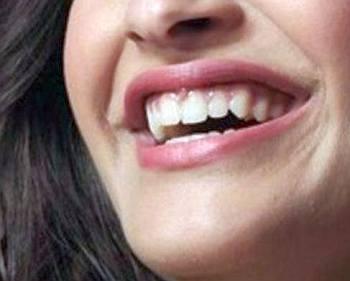
Dr Prema Vivekanandan, dentist and consultant orthodontist in Chennai, lists the common dental health problems and tells you how with a few minutes of care every day, you can avoid most of those problems.
A visit to the dentist is not high on priority list for most of us.
Besides the fear and discomfort, the cost factor is also a major deterrent. The wiser option is prevention.
1. Bad breath
Bad breath or halitosis is an unpleasant or foul odour emanating from the mouth.
Causes:
It is often the result of poor dental health. But in very rare cases they can also be an indication of an underlying systemic illness. However, in majority of the cases, the origin of the odour is found in the mouth itself.
Dental problems such as gum disease, cavities, and abscessed teeth are most common causes for halitosis. But respiratory tract infections, smoking or chewing tobacco products, alcohol consumption, eating certain foods like garlic, onion, fish and cheese can also cause bad breath.
Prevention:
Bad breath caused by dental problems can be easily prevented by brushing your teeth, cleaning the tongue and gums after meals, flossing and rinsing with a mouth wash.
2. Tooth decay or dental caries
Dental caries or cavity is the decalcification of the tooth enamel by the bacteria present in the mouth, leading to destruction of the enamel and the inner soft tissues.
Causes and symptoms:
Tooth decay starts when the bacteria in the mouth, acts on the carbohydrates present in the food, producing acid in the mouth. This demineralises the enamel, which is considered the hardest substance in our body, and eventually causes decay.
Unhealthy eating practice is one of the major causes. Foods rich in carbohydrates, carbonated drinks, sticky, sugary foods, especially biscuits and candy are a tooth's worst enemy.
Symptoms start with sensitivity in extreme temperatures, but as the decay progresses and the bacteria create a hole in the enamel, it spreads rapidly causing severe pain, infection and pus.
Sometimes pregnancy, certain medications and conditions like diabetes too can cause or aggravate the problem.
Treatment
Initially it is just a dark spot in the enamel of the teeth. This is the best time to visit your dentist. A simple filling with amalgam (a mixture of silver and mercury) or composite (a tooth-coloured filling), costing about Rs 400 to 600 is all it needs.
Ignore the problem and the infection spreads to the inner layers, first the dentine and then the pulp chamber, which houses the nerve and blood vessel of the tooth.
By this time, however, there is intense pain and sensitivity and it is too late for a simple procedure.
You now have to go in for a root canal treatment, which involves filling the root and fitting a crown over the weakened tooth. This procedure will set you back at least Rs 5,000 to Rs 7,000 depending on the material used.
Prevention:
As cliched as it might sound, brushing at least twice a day, flossing once a day and visiting your dentist for regular checkups every 6 months is all that is needed to keep dental decay at bay.
3. Gum disease or periodontal disease
Periodontal diseases refer to infection and inflammation of the tissues surrounding the teeth.
Causes and symptoms:
Plaque, a soft, sticky film that contains millions of bacteria slowly builds up on the surface of the teeth. This can be kept in check by regular brushing and cleaning between the teeth by flossing daily.
Unchecked build-up of plaque causes it to harden over time, forming tartar or calculus, which is nothing but calcified plaque.
As the tartar continues to build, gum tissues become swollen and red causing bleeding during brushing. This is the earliest stage of gum disease and is referred to as gingivitis.
Left untreated gingivitis will progress to periodontitis -- a more severe infection.
Slowly the gums begin to recede, exposing the root and causing sensitivity. Further advancement of the disease leads to bad breath (halitosis), pus formation, tissue destruction, and bone loss, which eventually causes tooth loss.
Poor dental hygiene, smoking, diabetes or a weak immune system often increase the risk for developing gum diseases.
Treatment:
Gingivitis is easily reversible. A simple scaling and some antibiotics is the usual course of treatment.
However a non-surgical treatment may not suffice if the infection has spread to the bone and may require a periodontal flap surgery.
Prevention:
Maintaining a good oral hygiene by brushing effectively, flossing and regular visits to your dentist helps to keep gum problems away.
Rinsing with salt solution or a mouth wash is also effective, but as an adjunct to brushing, not as a replacement.
4. Canker sores
Canker sores are small painful ulcerations typically found on the tongue or the inner lining of your cheeks, lips or throat.
Causes:
Injury to the mouth, faulty dentures, hot, spicy or acidic food, vitamin deficiencies, stress or an autoimmune disorder can cause canker sore.
Remember canker sores are not related to cold sores or fever blister, which is a viral infection, caused by the herpes virus and is contagious.
Canker sores can be extremely painful and cause discomfort while eating or talking.
Treatment:
Most canker sores rarely require treatment and often resolve on their own.
But if they persist beyond 3 weeks it is advisable to see a doctor.
Extremely painful ulcers can be relieved by application of topical anaesthetic and antimicrobial mouthwashes.
5. Temporomandibular joint disorders
Problems affecting the jaw joint are referred to as TMJ disorders.
Causes and symptoms:
This disorder is mostly common in people, who have the tendency to clench or grind their teeth during sleep.
Among older people, the cause is mainly due to osteoarthritis, a degenerative disease of the joints, which is caused by wear and tear of the joint cartilage.
A malocclusion or misalignment of the teeth or even missing teeth can eventually lead to problems in the jaw joint.
Stress or trauma to the jaw may also cause TMJ disorder.
Chewing gum, biting on fingernails and clenching teeth during stress are other causes.
TMJ disorders cause pain in the joint and adjoining areas.
There is reduced mobility and a clicking or popping sound is heard while opening the mouth wide.
Some people experience stiffness of the joint, ear pain, bite problems, dizziness and even frequent headaches.
Treatment:
A simple mouth guard, which is a flexible custom fitted device worn over teeth, at night can sometimes be helpful.
If the symptom is caused by inflammation of the joint, a steroid injection is sometimes prescribed to relieve the pain.
Surgeries like joint replacement or ligament tightening are considered only in severe cases.












 © 2025
© 2025